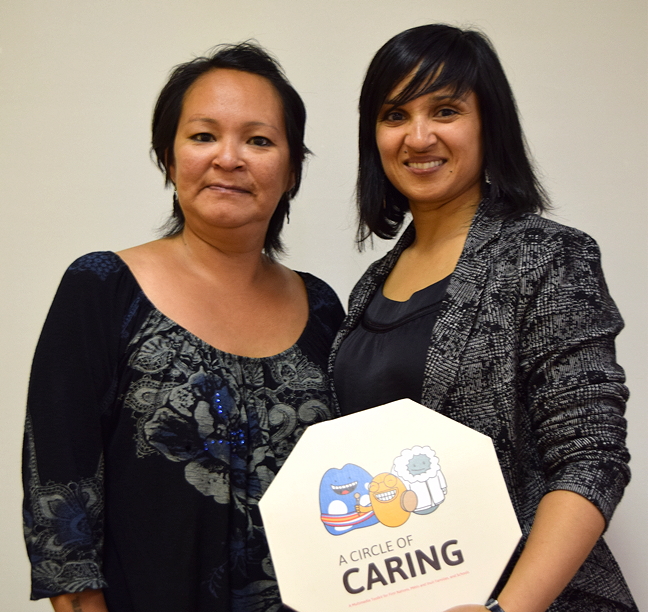By Courtney Edgar
Originally published at Nunatsiaq News
The basement of Ottawa’s Knox Presbyterian Church drew crowds May 19 for the sweet comforts of country food and the even sweeter lure of community.
Once a month, Tungasuvvingat Inuit holds a community feast where friends and family can gather to stay in touch, enjoy a hearty meal that brings the North down to the city and talk about shared challenges such as food scarcity and other social issues within the Inuit community, both in Ottawa and across the nation.
With the 2014 Council of Canadian Academies report stating that Nunavut residents experience food insecurity worse than any other community in the developed world, coming together for a feast is more than just a meal to many Ottawa Inuit – it’s a celebration.
Since, according to that report, 70 per cent of Nunavummiut are food insecure — half of those severely so — it’s also a way to share with those less fortunate ones and for some to count their blessings.
This month’s feast featured a presentation by the Centre ontarien de prévention des agressions, a francophone non-profit organization that focuses on children’s rights, human rights and child abuse prevention.

Tungasuvvingat Inuit’s Eve Cameron, left, and Mohini Athia, director of English language programs and services at Centre Ontarien pour la prevention des agressions pose for a photo May 19 at a TI community feast in Ottawa. Cameron partnered with COPA to narrate educational videos in Inuktitut called “A Circle of Caring”. The animated DVDs , available in multiple Aboriginal languages, are designed to prompt discussion and reflection on cultural pride and help Indigenous children succeed. (PHOTO BY COURTNEY EDGAR)
Founded in 1995, COPA provides educational resources, training and professional development throughout Ontario. For 21 years they have worked with more than 120,000 students in schools and organizations to bring about social change by teaching kids principles of empowerment, equity and inclusion.
Mohini Athia, the director of English language programs and services at COPA, presented the Circle of Caring project – a multimedia resource for First Nations, Metis and Inuit families, and schools.
She showed an animated short film and shared copies of illustrated storybooks written by Canadian children’s author Jody Nyasha Warner, as well as tool kits that included colouring books and a DVD of the animated film series available in seven Indigenous languages including Inuktitut.
“I’ve learned the complexities of what happens in each of the communities,” said Athia.
“Children and youth come down south and experience a lot of bullying because they don’t speak English. Or what happens is sometimes people from here go up north and they are missing the language or different aspects of their culture, so they get bullied too. It’s an outcome of a whole legacy of trauma and relocation.”
The Circle of Caring project was launched in October. Three years in the making, it was created through a grassroots approach of dialogue with Aboriginal families, elders and community leaders in Ontario. The purpose was to prompt discussion and reflection on cultural pride, helping children succeed, understanding discrimination, and nurturing safe schools and communities.
“There are very unique circumstances and challenges,” said Athia. “That was very important for us to address in the resources. So we have adapted it for parents and family members, and for the schools that support indigenous families.”
“We come to reconnect with community members,” said Maatalii Okalik, the president of the National Inuit Youth Council
COPA’s message resonated with some of the people who attended the feast.
“The bullying part was very good,” said Sharon Lumley, who attends TI feasts to learn a new language. She brings her therapy dog Chiquii.
Some members of the community recalled their own experiences with bullying and violence in their youth. One spoke about her experiences at residential schools and being relocated. The feast was an opportunity to tell stories and to foster relationships – over caribou meat, fish and seasoned mashed potatoes.
Mary Akavak, who comes from Kimmirut but has lived in Ottawa for the last dozen or so years, says she comes for the “native foods” because they’re hard to find in Ottawa. She brought her daughter Joy Akavak, 24.
“We come to reconnect with community members,” said Maatalii Okalik, 26, the president of the National Inuit Youth Council. “To see friends. To share updates and enjoy country food. To remember that we’re blessed. It really serves as a celebration.”